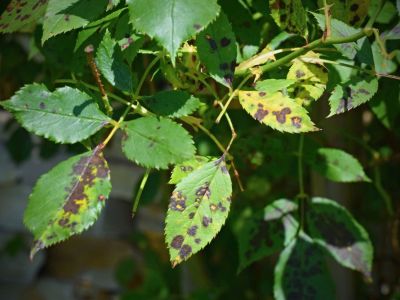Plants with Spotted Leaves
Fungal leaf spot can be found in your outdoor garden as well as on your houseplant. Spotted leaves occur when fungal spores in the air find a warm, wet, plant surface to cling to. As soon as that microscopic spore gets comfortable in its new home, sporulation (the fungal method of reproduction) occurs and the tiny, brown fungal leaf spot begins to grow. Soon the circle grows large enough to touch another circle and now the fungal leaf spot looks more like a blotch. Eventually the leaf turns brown and falls to the soil where the spores sit and wait for the next available warm, wet, plant surface so the fungal leaf spot process can begin again.
Preventing Plant Leaf Spots
There are a few easy steps you can take to prevent the problem in your garden or on your houseplant. Spotted leaves, or the causal fungus, need two things to flourish: moisture and poor air circulation. For your houseplant, spotted leaves can be prevented by watering the soil and not the foliage. Leave enough space between your pots for good air circulation. In the garden, water in the early morning so the moisture will evaporate from the leaves. Closely packed foliage should be thinned. Always treat pruning and cutting tools with a 1:10 bleach solution after each use. Rake and remove all debris from around your plants before the leaves bud each spring.
How to Treat Leaf Spot Fungus
No matter how diligent you are, the day will come when those tiny, brown circles appear on the leaves of your plant so it’s important to know how to treat leaf spot fungus. As soon as you see plant leaf spots, treatment begins. For houseplants, isolate the pot immediately to prevent the fungus from spreading. Remove any leaf that has been affected. Stop misting. In the garden, the plant’s leaf spot treatment depends on preference. For organic treatment, there are several safe and convenient treatments available. Most contain sulfur or copper octanate. Or you can try a more traditional treatment by spraying with a mild solution of bicarbonate of soda (baking soda), using ½ teaspoon per gallon (2.5 mL. per 4 L.) of water. For those gardeners who have no objection, many all-purpose fungicides are available. Please read the label carefully before applying.
